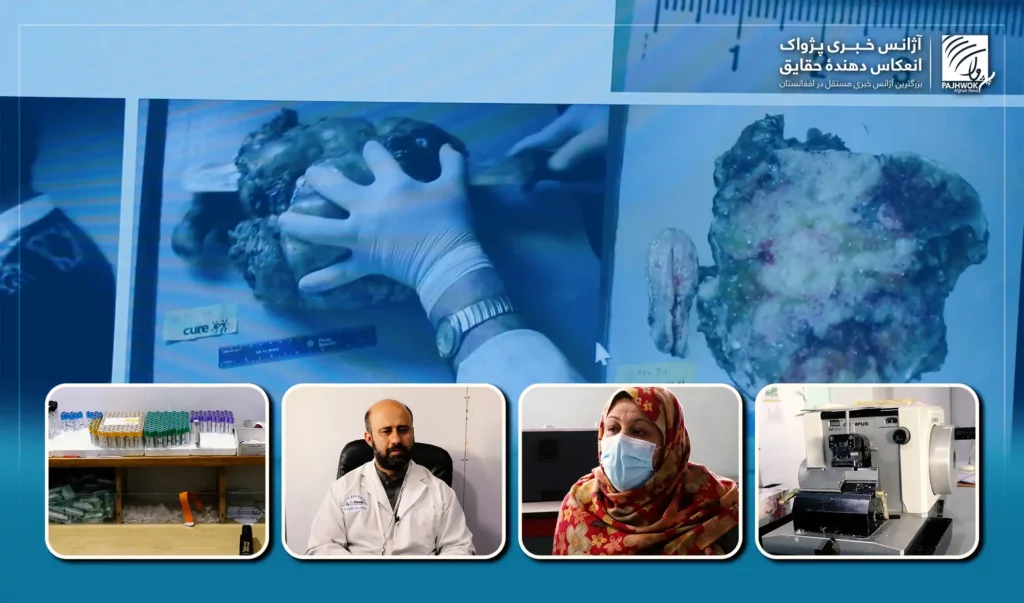KABUL (Pajhwok): Cancer women patients say the government should pave the way for their treatment inside the country so they avoid going abroad and spending huge amount of money.
Last year, the Ministry of Public Health (MoPH) announced that annually 23,000 Afghans contract cancer and 16,000 of them die from it.
Dr. Mohammad Omar Malikzai, head of pathology department at Cure Hospital, told Pajhwok Afghan News: “Cancer is caused by the uncontrolled proliferation and division of cells.”
“In normal state, cells grow and develop, but in cancerous state, they multiply abnormally and uncontrollably and the tumor it forms, as a result, it enters the blood and transfers to the vital areas of the body and causes death,” he explained.
According to him, contracting cancer has different factors, but exposure to chemical radiation, eating some low-quality and non-standard foods are the most vulnerable factors of getting cancer.
There are different types of cancer, he said, adding that based on research, in Afghanistan, the most common type of cancers include breast cancer in women, digestive system cancer among men and skin cancer.
He said most people in Afghanistan worked as farmers and they developed skin cancer for being exposed to ultraviolet rays.
Dr Malakzai said the number of cancer cases in the country was increasing and adding: “Patients used to go abroad for diagnosis and treatment, but now cancer diagnosis is possible in the country and up to 200 patients visit Cure Hospital every month.”
He said currently chemotherapy and drug treatment of such patients were carried out in hospitals inside the country, but no radiation treatment existed in Afghanistan and patients had to go abroad.
He called visiting doctor on time vital and said: “If a woman finds out a tumor in her body and feels that changes have taken place in her body, she is diagnosed as sick in the first stage and the initial stage of surgery is performed with less expenses, but some breast cancer patients do not go to a doctor due to cultural restrictions.”
“For instance, there were patients who had cancer in one breast, but their other breasts also got affected, when we ask the patient, she says she did not go to the doctor earlier because she felt ashamed and could not dare to tell her problem,” he explained.
According to him, cancer patients should go to the doctor as early as possible because it is treated with less expenses and if cancer enters the next stage, it is necessary to have a CT scan, chemotherapy… it becomes difficult to treat and they have to go abroad for treatment. In addition, they have to pay large amount of money in foreign countries.
Malakzai considered it necessary to raise awareness about cancer disease and said that there should be publications about the disease through audio, video and print media.
Cancer patients want facilities inside the country.
Rita, one of the cancer patients at Cure Hospital, who was diagnosed two years ago and is now undergoing treatment, said: “I had a black mole on my leg, it became a gland, it was on my leg for 17 years, but it didn’t bother me at all. I thought it is a normal thing, when I realized that this mole has become glandular, I went to the doctor and my operation was done at the Cure Hospital, the doctor said you should go to Pakistan for treatment, because your treatment is not possible here.”
She added that she went to Pakistan 15 times in two years for treatment and had radiation 40 times.
She said: “Eight months ago when I went to Pakistan. Doctors examined me and said there was no danger… your treatment has good result and your wounds have healed. I am fine now.”
She asked the government to make it easier for cancer patients so they don’t have to go abroad for treatment.
Also, Fouzia, a 45-year-old woman who has been suffering from cancer for eight years, said she spent all her time and money on treatment, but her condition did not improve.
She pointed to the spot on her lower back and added: “First, I had a spot on my back, it always bled. I went to the doctor a long time ago and it didn’t get better.”
She asked the government to facilitate treatment of such patients inside the country.
Dr. Qalandar Ebad, Acting Minister of Public Health, had previously said in a program that Afghans spent half a billion dollars annually on treatment abroad.
He called this amount a heavy cost for the country and said that in order to solve this problem, he had started bringing reforms and renovation in hospitals and for the implementation of this program, about four billion afghanis had been allocated.
He said once hospitals were fundamentally renovated and equipped, skilled and experienced Afghan doctors living abroad would be invited.
sa/ma








GET IN TOUCH
NEWSLETTER
SUGGEST A STORY
PAJHWOK MOBILE APP